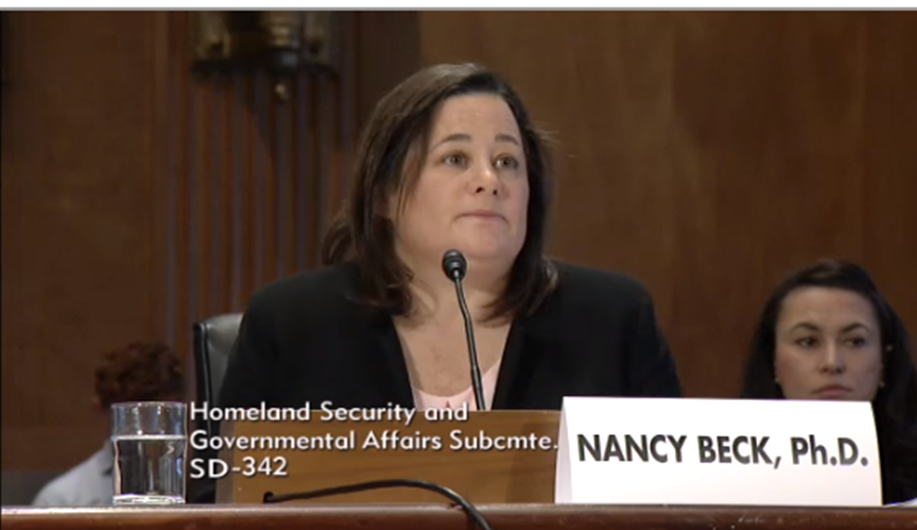Today the Senate holds a hearing on the nomination of Dr Nancy Beck to chair the Consumer Product Safety Commission (CPSC). I doubt you spend much time thinking about the CPSC, but the little-known agency plays a crucial role in ensuring that the products in our homes are safe. And when things go wrong, that’s when you do hear about it—from lunchboxes contaminated with lead, to faulty jogging strollers that have injured children, to crib recalls due to infant deaths.
The Trump administration has already made harmful picks for commissioners at the CPSC, and under this administration’s tenure, the agency has had the lowest number of child product recalls in more than a decade. Nancy Beck is more bad news. For the full scoop on the risks to public health imposed by Beck’s problematic and conflicted history of interfering in science, see my colleague Genna Reed’s posts here and here.
Yesterday, at a Senate briefing hosted by Senator Richard Blumenthal and Senator Tom Udall, I spoke alongside advocates and parents who told powerful stories about lost loved ones and the dangers of having someone like Nancy Beck in charge at the CPSC. You can watch the full recording of the event here, and my comments are below. Finally, please contact your Senators and tell them that Nancy Beck is a dangerous choice for the CPSC.
“I join you today as a scientist who has studied environmental threats for more than a decade and I can say with certainty that Dr. Nancy Beck is a bad choice to chair the Consumer Product Safety Commission. Her fringe scientific views and alarming record on public health make her wholly unqualified for the job.
While Dr Beck is a scientist, we need only take a brief look at her history to see clearly that her views are anything but mainstream science, and her actions anything but responsible. Instead, she has an extensive record of challenging scientific conclusions at every turn and interfering in science-based policymaking.
- While at the American Chemistry Council, Beck has consistently challenged the weight of the evidence demonstrating harm of chemicals, straying far from the conclusions of the broader scientific community in assessing dose-response models at low doses. By undermining these models, Beck undermines public health, opening the door to industry’s arguments that toxic chemicals aren’t all that bad—or that the science isn’t clear, even when it is.
- At the White House Office of Management and Budget, Beck’s team made direct, substantive edits to scientific research that falsely inflated uncertainty, and in several research papers even directly cut out scientists’ mention of potential human health harms. This demonstrates Beck’s fine-tuned ability to cast unwarranted doubt on science by picking it apart sentence by sentence, and second, her willingness to do so while working as a political official at a political agency.
- At the Environmental Protection Agency, Beck has tried to limit how many uses of a chemical the EPA should consider when evaluating its harm to human health. In so doing, Beck abandoned EPA’s obligation to consider the many ways that people can be and are harmed by chemicals in consumer products.
- At the White House National Economic Council, where she’s currently detailed, Beck was likely responsible for rewriting an EPA evaluation on the dangerous chemical, TCE, to downplay its link to fetal heart defects.
I’m not alone in assessing Dr Beck’s views as fringe. Scientific and legal authorities have made clear that her views and work are too extreme to be implemented. In 2006, the National Academy of Sciences issued a public rebuke of Beck’s effort to alter the EPA’s assessment process, calling it “oversimplified” and “fundamentally flawed.” Three years later, a House oversight committee slammed Beck in a 2009 report, outlining her direct interference with science while at OMB. And the 9th Circuit Court of Appeals shot down her proposed changes, too. Throughout her career at OMB and at EPA, Beck’s scientific colleagues left a paper trail of dismay at Beck’s disregard for scientific independence.
Even looking only recently, it is clear that Beck’s work harms the public. Just this month, news broke that Beck worked to suppress guidance from CDC experts on COVID-19 from reaching the public. Days before the guidance was officially squashed, Beck gave false reassurance to a CDC official that the guidance would go public soon: “They need to be approved before they can move forward. WH principals are in touch with the task force so the task force should be aware of the status.” Turns out, the White House would not approve the document and make it public, despite clearance from CDC head Robert Redfield.
As a scientist, I’m concerned about the decisions Beck will make at the CPSC, but as a mom of two young children, I’m alarmed. At the CPSC, Beck will oversee science-based decisions that will affect your family and mine. She will have to make judgment calls about how safe a child stroller is, how many infant deaths is enough recall a crib, and how much lead is too much contamination for a child’s lunch box. How can I trust that she’ll choose to protect my children with her record of going against the science and failing to protect people time and time again? If her record is any indication of how she will act, we cannot trust her at all.”

